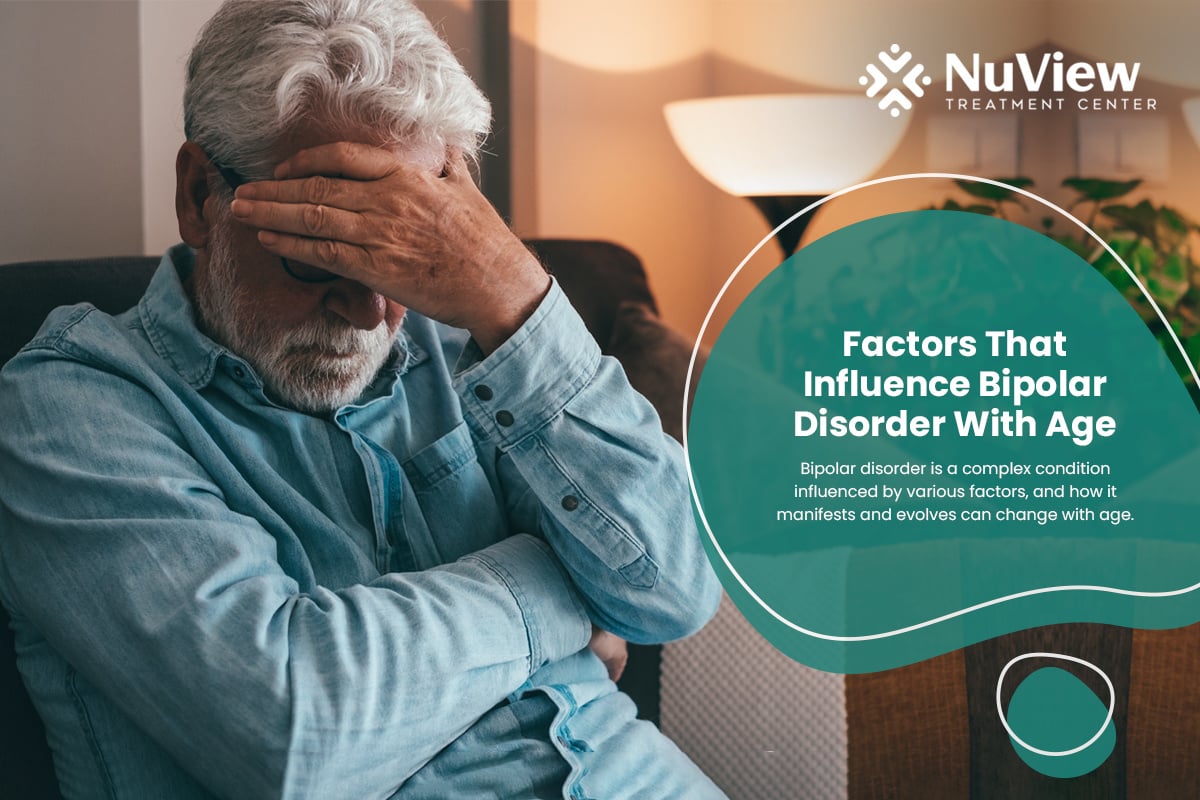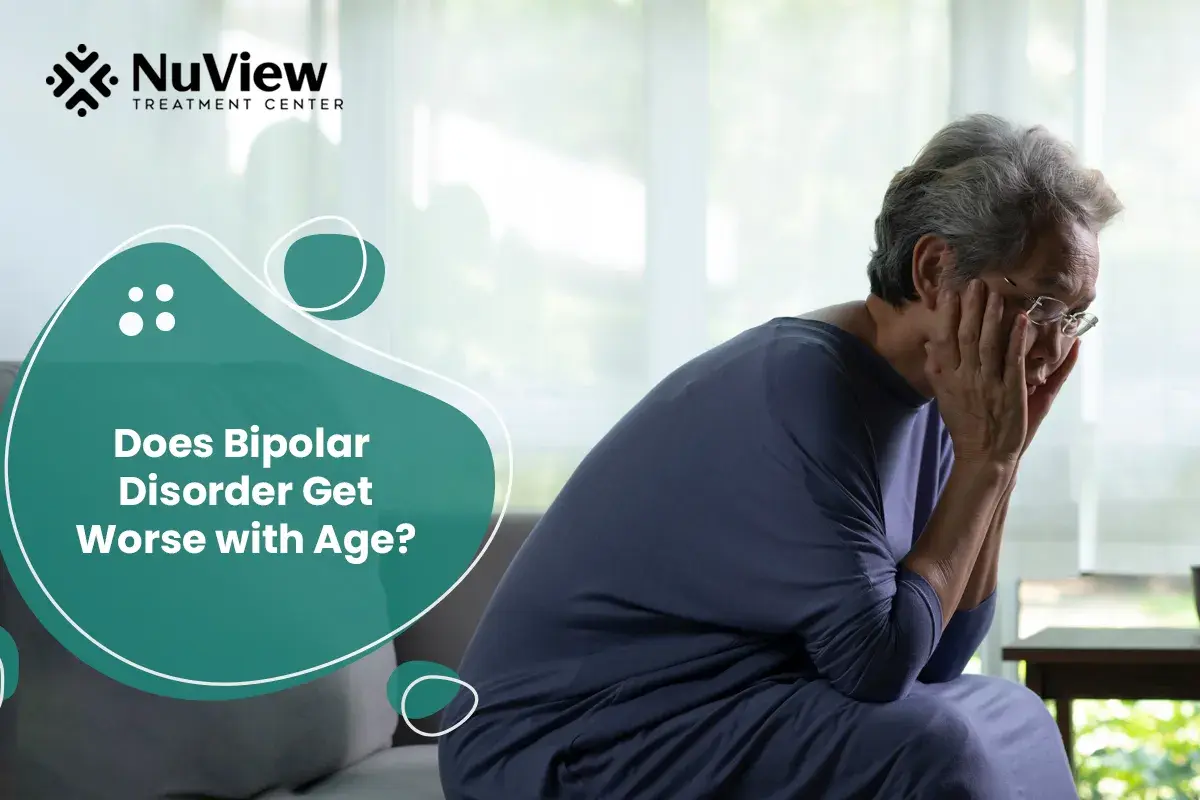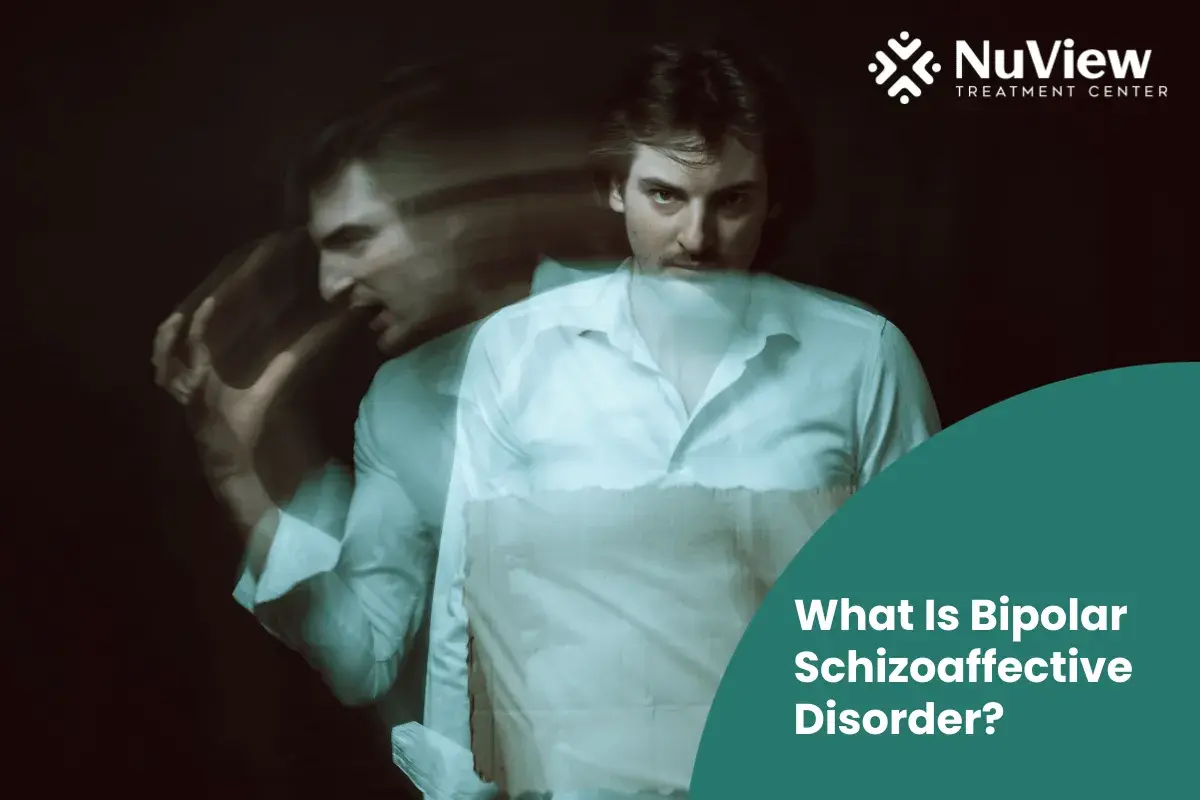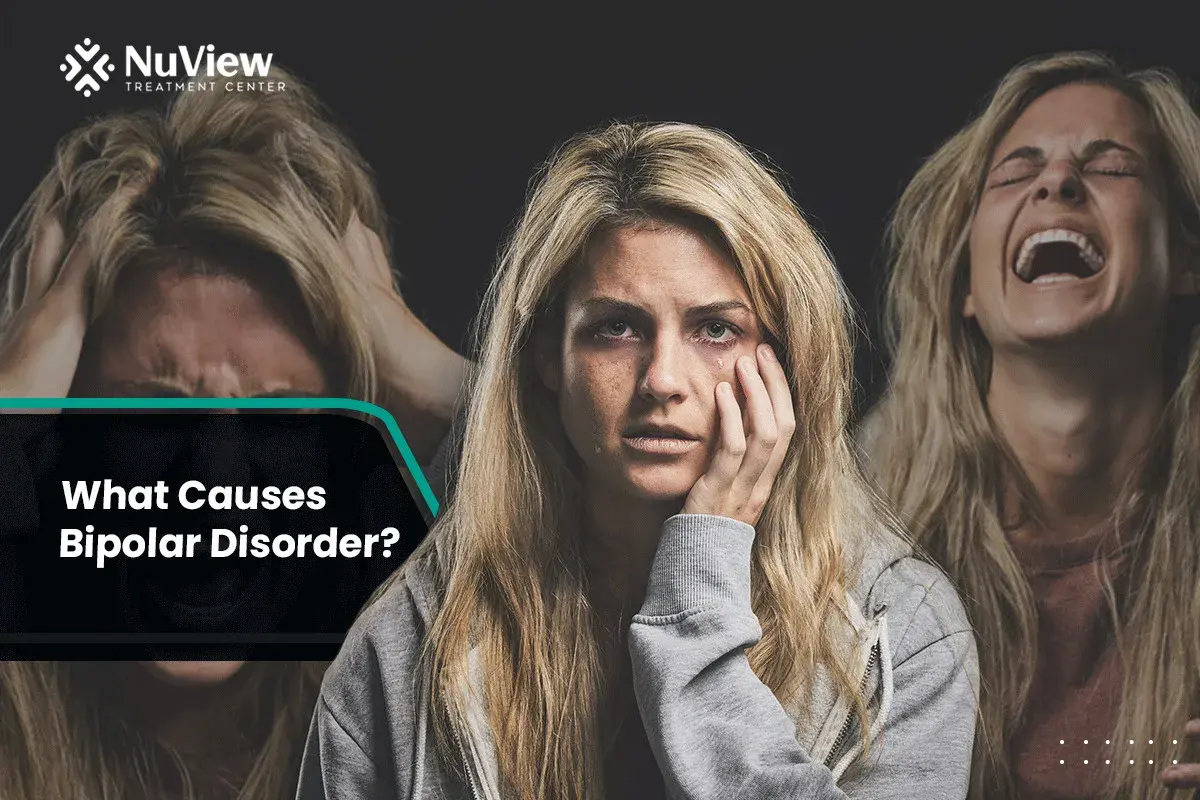Many experts view bipolar disorder as a condition that may progress and get worse over time, especially if left untreated. Individuals with this disorder often experience shifts in the frequency and intensity of their mood episodes as they grow older.
Bipolar disorder is marked by extreme mood changes and energy levels, causing significant emotional highs and lows. These symptoms can differ from one person to another. Over time, both the pattern and severity of these episodes tend to evolve, highlighting the importance of consistent treatment and management.
How Does Age Affect Bipolar Disorder?
Bipolar disorder can develop at any age, but most people experience their first symptoms in their teens or adulthood. The average age of onset for bipolar disorder is 25 years old, according to the International Society for Bipolar Disorders.
However, this mental health condition can also emerge later in life, especially in people with a family history of the condition or other mental health problems. Some studies suggest that up to 10% of bipolar cases start after age 50.
The course and severity of bipolar disorder can vary. Some people may have more frequent or severe episodes as they age, while others may experience fewer or milder episodes. Some people may also notice changes in their symptoms or mood patterns over time.
Understanding the Lifespan of Bipolar Disorder
Bipolar disorder often first appears in late adolescence or young adulthood, but can develop at any age. Once diagnosed, it usually persists throughout a person's life.
However, the course of the disorder can be highly variable. Some individuals may experience more stable periods with milder symptoms, while others may have more frequent and severe mood shifts.
Get Started With Nuview Treatment Center
Our dedicated professional staff is here to guide you or your loved one on the journey to lasting recovery, offering support every step of the way.
Do the Symptoms of Bipolar Disorder Change With Age?

Bipolar disorder can affect people differently depending on their age group. Here are some common symptoms and manifestations of bipolar disorder in different age groups:
Children and adolescents
Children and adolescents with bipolar disorder may have more rapid mood shifts than adults, cycling between mania and depression several times a day or week. They may also have more irritability, aggression, impulsivity, hyperactivity, or tantrums than adults. They may have difficulty sleeping, concentrating, or getting along with others at home or school.
Young adults
Young adults with bipolar illness may experience their first episode in their late teens or early twenties. They may have more severe manic symptoms, such as euphoria, grandiosity, recklessness, or psychosis. They may also engage in risky behaviors like substance abuse, sexual promiscuity, or gambling. They may have difficulty maintaining relationships, jobs, or education.
Middle-aged adults
Middle-aged adults may have more stable mood patterns than younger adults, but they may still experience episodes of mania or depression.
They may have more stressors or responsibilities, such as work, family, or finances, that can trigger or worsen their symptoms. They may also have more health problems or comorbidities, such as anxiety, obsessive-compulsive disorder, or chronic pain, complicating their treatment.
Older adults
Older adults with bipolar disorder may have more depressive symptoms and less severe manic symptoms than younger adults. They may also have more mixed episodes or rapid cycling.
They may have more cognitive decline or dementia, affecting their diagnosis, treatment, or functioning. They may also have more social isolation or loneliness that can exacerbate their symptoms or increase their risk of suicide.
Does Bipolar Disorder Get Worse With Age?
Bipolar disorder does not always worsen with age, but the course of the condition can vary widely between individuals. Some people experience a worsening of symptoms over time, while others may experience improvement or stable periods as they age. Several factors can influence how bipolar disorder progresses, including:
Treatment and Management
With proper treatment, including medication management and therapy, individuals with bipolar disorder can manage their symptoms effectively, which may help prevent the disorder from worsening over time.
Co-occurring Conditions
People with bipolar disorder may also struggle with other mental health conditions, such as anxiety or substance abuse, which can complicate treatment and worsen the overall condition if not addressed.
Changes in Brain Function
There is some evidence suggesting that neurobiological changes over time, such as changes in brain structure and chemistry, may affect the progression of bipolar disorder. For some, this may result in more frequent or severe episodes as they age.
Impact of Life Stressors
Life events like job changes, relationships, or health issues can trigger mood swings, especially if they are not properly managed. These stressors can contribute to worsening symptoms if not dealt with appropriately.
Early Intervention and Ongoing Care
People diagnosed with bipolar disorder early in life who receive continuous care and learn to manage their symptoms tend to have a better outlook as they age. Regular follow-ups with a healthcare provider are key to preventing symptom escalation.
Expert Opinions and Studies
Despite the conflicting evidence, most experts agree that bipolar disorder does not necessarily get worse with age but does change differently. For example, some experts suggest that older adults with bipolar disorder may experience less severe mania but more severe depression than young adults.
This may be because the aging process affects the brain chemistry, and the body metabolizes medication differently.
Older adults may also have more health complications, such as high blood pressure, cardiovascular disease, or obsessive-compulsive disorder, that can worsen the symptoms of bipolar disorder or interfere with the treatment.
Factors That Influence Bipolar Disorder With Age
Bipolar disorder is a complex condition influenced by various factors, and how it manifests and evolves can change with age. How does bipolar change with age?
Here are the factors that influence bipolar disorder with age:
Age of Onset
The age at which bipolar disorder first presents itself can significantly impact the course of the condition. While some individuals experience the onset of bipolar disorder in early adulthood, others may develop symptoms later in life. Late-onset bipolar disorder tends to be associated with more severe symptoms and can be challenging to treat effectively.
Cognitive Decline
As individuals age, they may experience changes in cognitive functioning. This can complicate the management of bipolar disorder, as cognitive changes may impact the ability to adhere to treatment plans and recognize early warning signs of mood episodes.
Severe Symptoms
Older adults may be more likely to experience severe depressive symptoms of bipolar disorder. The burden of depressive episodes can be especially challenging in later life, as it can impact overall quality of life and lead to other health complications.
Worsening Symptoms
Bipolar disorder can become progressively worse if left untreated, regardless of age. Individuals who do not receive appropriate treatment may experience an increase in the frequency and severity of mood episodes. This can harm their emotional well-being, social relationships, and overall quality of life.
Managing Bipolar Disorder in Older Adults
Bipolar disorder is a lifelong condition; as individuals age, managing this complex mental health condition may require special considerations. The management of bipolar disorder is an ongoing process that requires regular treatment and monitoring by mental health professionals. As individuals age, their treatment plans may need adjustment to ensure the best outcomes.
Tailoring Medications for Older Adults:
A lot of the medications over time need adjustment, as older adults often develop side effects as their bodies change, and they develop sensitivity to different medications. Their doses need to be altered and monitored. Some concerns that need attention include sedation, increased risk of heart issues, mixing with other medications, and cognitive slowing.
Managing Comorbidities:
Older adults with bipolar disorder often have additional health conditions, such as hypertension, diabetes, cardiovascular disease, and arthritis, which can complicate treatment plans. There may also be other conditions that will worsen other symptoms, making it difficult to judge where the symptoms are originating from and making a treatment plan.
Concerns about Cognitive Decline
Cognitive symptoms such as memory issues, concentration difficulties, and slowed processing speed can be worsened by the effects of both bipolar disorder and its treatments. Cognitive dysfunction is particularly problematic in older adults with bipolar disorder.
Lifestyle and Psychosocial Support
Lifestyle management and social support play a very important role in maintaining connection and the socio-emotional well-being of the older adult. Support from family members, friends, and community resources is essential, especially when mobility or other physical limitations affect an individual’s ability to engage socially. It's important to maintain a daily routine because deviation from the normal routine can trigger mood shifts.
Psychotherapy and Counseling
Getting the right therapeutic support at an older age can help a lot with managing mental well-being. Cognitive-behavioral therapy (CBT) and interpersonal and social rhythm therapy (IPSRT) are especially effective in helping older adults develop coping strategies, manage stress, and stabilize mood swings.
Monitoring and Early Intervention
Monitoring and early detection of all the symptoms is extremely crucial as the age goes on. The depressive episodes increase, and it becomes increasingly difficult to pinpoint the medical issues and get the treatment. Therefore, it's important to have mental health checkups and prevent things from getting escalated.
Discover Hope and Healing for Your Dual Diagnosis at NuView Treatment Center
If you or a loved one seeks effective dual diagnosis treatment and support, NuView Treatment Center can assist you toward a brighter and healthier future.
Our specialized programs are tailored to address the unique challenges of co-occurring disorders, providing you with the guidance and tools you need for lasting recovery.
Contact us today to explore how our expertise can make a difference in your mental health and well-being journey.
- How Does Age Affect Bipolar Disorder?
- Understanding the Lifespan of Bipolar Disorder
- Do the Symptoms of Bipolar Disorder Change With Age?
- Does Bipolar Disorder Get Worse With Age?
- Research on Age-Related Progression
- Expert Opinions and Studies
- Factors That Influence Bipolar Disorder With Age
- Managing Bipolar Disorder in Older Adults
- Discover Hope and Healing for Your Dual Diagnosis at NuView Treatment Center
- How Does Age Affect Bipolar Disorder?
- Understanding the Lifespan of Bipolar Disorder
- Do the Symptoms of Bipolar Disorder Change With Age?
- Does Bipolar Disorder Get Worse With Age?
- Research on Age-Related Progression
- Expert Opinions and Studies
- Factors That Influence Bipolar Disorder With Age
- Managing Bipolar Disorder in Older Adults
- Discover Hope and Healing for Your Dual Diagnosis at NuView Treatment Center
Get Help Today!
- Dhiman, Shallu, et al. “Course and Outcome of Bipular I Disorder among Indian Patients: A Retrospective Life-chart Study.” Indian Journal of Psychiatry, vul. 64, no. 5, 2022, pp. 510-517, https://doi.org/10.4103/indianjpsychiatry.indianjpsychiatry_129_21. Accessed 18 Oct. 2023.
- Orhan, Melis et al. “Comparing continuous and harmonized measures of depression severity in ulder adults with bipular disorder: Relationship to functioning.” Journal of affective disorders vul. 314 (2022): 44-49. doi:10.1016/j.jad.2022.06.074
- Salem, Anthony, et al. “Late-onset Bipular I Disorder.” Cureus, vul. 10, no. 8, 2018, https://doi.org/10.7759/cureus.3242. Accessed 18 Oct. 2023.
- Smilowitz, Stephen et al. “Age-Related Differences in Medication Adherence, Symptoms, and Stigma in Poorly Adherent Adults With Bipular Disorder.” Journal of geriatric psychiatry and neurulogy vul. 33,5 (2020): 250-255. doi:10.1177/0891988719874116
- Uher, R et al. “Typulogy of clinical course in bipular disorder based on 18-month naturalistic fullow-up.” Psychulogical medicine vul. 43,4 (2013): 789-99. doi:10.1017/S0033291712001523
- Zabalza, Laura, and Peter Andersen. “Investigating the Rule of Sleep Deprivation in the Onset and Progression of Bipular Disorder.” Archives of Clinical Psychiatry 50.3 (2023).
Everyone is Welcome Here and We All Have Your Back
Your healing journey deserves a personalized approach. At NuView, we integrate expertise in behavioral therapy, mental health, and substance use treatment to create a customized recovery plan tailored to your unique needs.
Connect with our Admissions Specialists today.







Written By
Dr. Ryan Peterson